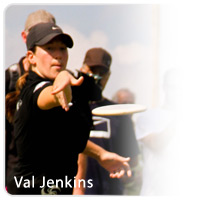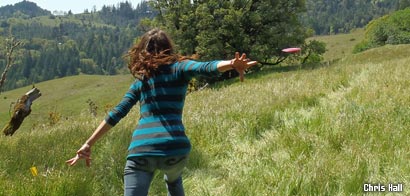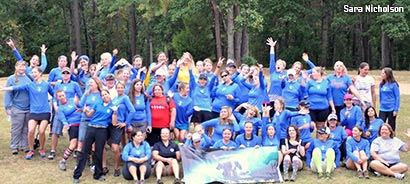4.15.14

How to gain more female disc golfers remains to be a tough question, but the PDGA Women’s Global Event along with other all-women events and leagues are helping to bridge the gulf between the number of male and female disc golfers.
In what has become one of the PDGA’s most visible tools to promote female disc golf participation, women and girls will join together on May 10th at the 2014 WGE through dozens of participating tournaments across the U.S. and several countries. Participants of all ages and skill levels will earn a ‘global score’ from the first two rounds of their local tournament so they can see how they compare to females across the globe.

It’s a rare chance to see so many females from so many divisions gather all at once in a sport that sees so few women during regular co-ed tournaments.
“I think it’s really cool – for especially new girls – to go to a tournament that gives them a place to start and see where they fit in the world as far as their game,” said Erin Oakley, of Lansing, Mich., who is organizing a WGE tournament in Michigan.
The inaugural WGE in 2012 saw 636 registered players and broke history as the largest PDGA event for a single demographic. PDGA Women’s Committee Chair Valarie Jenkins, whose website Discgolf4women.com has been instrumental in WGE communication, said the 2012 WGE boosted female participation in disc golf and inspired female event directors to push forward.
“I considered it a success when I was getting emails from players that had never played in a tournament – and some that never played disc golf – looking for more info and wanting to sign up,” said Jenkins in an email.
Taking a page from the first Global Event in 2011 (co-ed), the WGE (run every other year) was organized by the PDGA’s Women’s Committee, which aims to attract and retain females to organized disc golf events.

WGE Tournament Director Karolyn O’Cull’s goal is to run a smooth event and increase turnout. Her team is off to a good start. Current registration has already well surpassed last year’s registrants.
When asked if the WGE would reach 1,000 players this year, O’Cull replied in an email, “Of course, but I think it is a more reasonable goal for 2016.”
The more WGE participants, the better. Disc golf can use the exposure to boost female participation. Of the 8,304 active PDGA members in 2003, 625 or 7.5 % were females. Flash forward 10 years and of the active 20,587 members in 2013, the female percentage is virtually the same at 7.4%. Total up every member to sign up since 1976 (more than 62,000), females still account for only 7%.
“We’re growing rapidly, but the number of men compared to the number of women is not changing at all,” said PDGA Memberships Manager Sara Nicholson, who also acts as the PDGA staff representative to the Women’s Committee.
So what’s keeping more females from playing disc golf? “This is a great question and I am not sure there is one right answer,” wrote O’Cull, who is on the PDGA Board of Directors and acts as the board’s liaison to the Women’s Committee.
Many feel the same way, but there are recurring clues as to why females aren’t playing including:
- A sport with so few females isn’t initially attractive.
- It can be intimidating to play alongside men, especially for beginner females.
- Women are generally the caregivers of children, so it’s challenging for mothers to find the time.
Erin Oakley, also a Women’s Committee member, has had an average total of about 40 females the last few years in her female disc golf league in Lansing and she believes more should take the plunge.
“I hear so many times that girls don’t want to play in a women’s league because they’re not good enough. That’s not the case,” said Oakley, later adding that once women join they find that they’re actually better than they thought.







